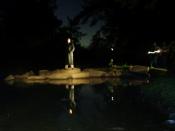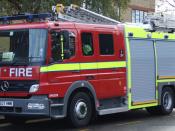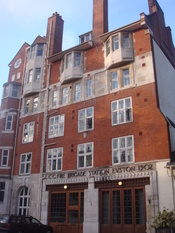LIFE AS A FIRE FIGHTER IN THE LONDON FIRE BRIGADE
Biography of Steven Edwards, Senior Officer, Walthamstow Fire Station
Steven Edward's career began, not in the Fire Brigade, but in the Film Industry. He had a great job cutting and editing film, great salary and prospects but no excitement. For years he wanted more than "just a job", he wanted the "thrill factor" to go with it.
It was talking to his uncle, a retired Senior Officer commended for bravery and stationed in Harrow, who encouraged and convinced him that he had the makings of being a great fire fighter and that that the way forward. He told him all he needed to know to join the Brigade from applying for the job, training and how his career would develop. He was full of praise for the fire fighters who he considered to be his "extended family" and very proud to be a fire fighter.
Newly married at the age of 26 years old in November 1980 he decided to take the plunge and with the support from his wife, he joined the Brigade. He first had to undergo a medical which included physical strength and lung capacity, good vision and hearing. He then spent 18 weeks training which covered theory lessons and practical skills such as searching rooms, working in smoke and using fire-fighting and rescue equipment. At home he was difficult to live with but managed to pass with flying colours whilst others failed to make the grade.
He began his career at Soho Fire Station in London and was put to work ventilating fires once they were extinguished. It was a further six months before he was able to assist his colleagues in tackling fires and to eventually get to do what he was trained for.
A typical rota for each fire fighter consisted of 2 days working 9am -6pm day shifts, followed by 2 nights working 6pm-9am in the morning which followed by 4 days leave.
The duties during the day consisted of:
equipment check - especially breathing apparatus and any machinery to be used
tea break
a list of "to do's" is always in place for each station to carry out on a daily basis which cover each day of the year
a list of "monthly tests" which are carried out; and
a list of yearly tests, which might be carried out.
There is then what is known as a period of "stand easy" which is a break of about 15 minutes at 11am where each officer can talk and discuss anything with their fellow officers.
After that time there are numerous Fire Safety visits whereby Fire Officers visit Schools, Hospitals, Nursing Homes etc. in the Local Community to help in the prevention of fires and promote safety.
On duty at Soho Station were 3 engines ready for action at any one time.
After lunchtime a series of training schedules and/or lectures would be carried out.
By 4pm some officers would then attend the gym. It is the general consensus nowadays that fire fighters are fitter than ever before (this can only be said for this country at least) with the trends changing - encouraging healthy eating and a consistent gym training schedule.
His most vivid memory during his time as a fire fighter was when he was on night duty almost 10 years ago. It was during a night shift that a "shout" was received reporting a fire in a flat in Euston with persons present. Their Watch attended the scene and, although the flat was on the ground floor, grills on the windows and doors prevented access. Neighbours reported screams from the flat so it was imperative that they gain access as quick as possible. He eventually managed to remove a grill from a high window towards the rear of the flat and after doning his breathing apparatus, inside he went.
He found the bodies of two women, mother and daughter in the kitchen - they were unconscious from all the smoke and visibility was nil. After what seemed an eternity he managed, one by one, to rescue the two women while his colleagues were busy fighting the fire around the front of the flat. Unfortunately, the two women died later in hospital from smoke inhalation and he was in hospital for many months after that episode through tearing his stomach muscles as a result of lifting the two women to safety. The irony of the story was that they had a dog that was later found shut in the bathroom - he survived.
In order to deal with the traumas of what happens on shouts the fire fighters do spend time talking about situations that they faced themselves with and are also offered counseling as an additional service. Perhaps the worst thing for fire fighters is frustration i.e. not being given the correct information can be imperative in the saving of a person's lift and it is easy for them to blame themselves as a result of this.
The turning point in his career came in 2002, the year of the Strike. The whole of the Fire Brigade went on strike in order to gain the same rates of pay as a tube driver in the public sector. Although, initially, the public supported the Brigade, the Government attacked them by using the media to bring down the public support and even brought about introducing changes to their entire system e.g. by reducing night shifts with a risk to the general public and by suggesting the Brigade be used in combating chemical warfare to name but a few. The Fire Brigade ended up striking just to keep their jobs safe - it was a very worrying period for him and the Brigade as a whole.
Since the end of the Strike, life with the Brigade has never been the same. Defibulators will be soon attached to Fire Engines with the view that they will be able to save heart attack victims (their attendance rate is faster than an ambulance), whilst at the same time who will fight the fire?
He has five years of active service left and cannot wait to leave. This is a sad way to end a career where there was so much inspiration for him to join in the first place. With so many children still in awe of being a Fire Fighter (just like he was), his advice to anyone wishing a career in the Fire Brigade is "forget it" and "don't do it" and his views are not isolated on this but it does seem such a shame for a career that had so much to offer to be ending amongst so much disillusionment.
Alison Murphy


